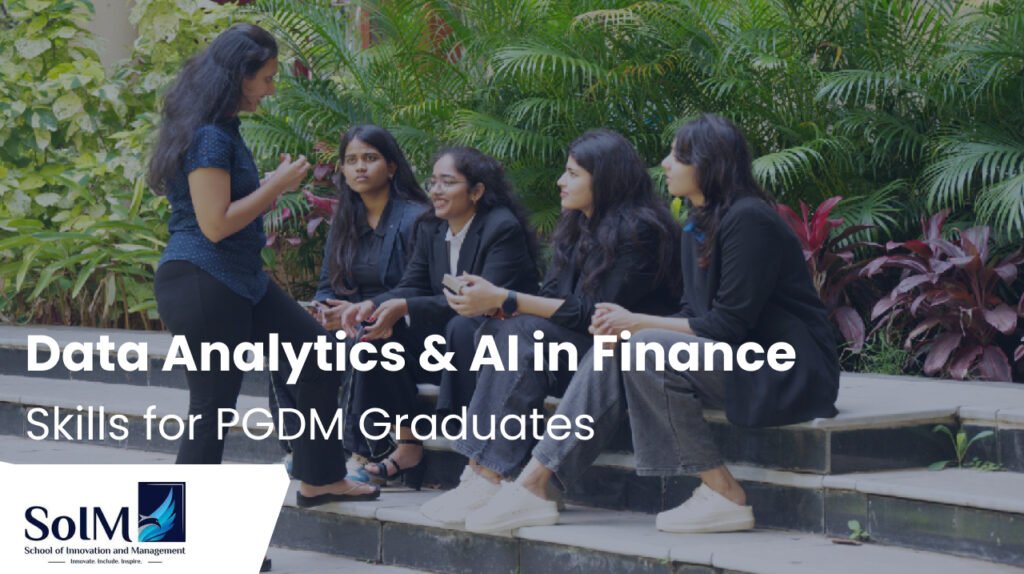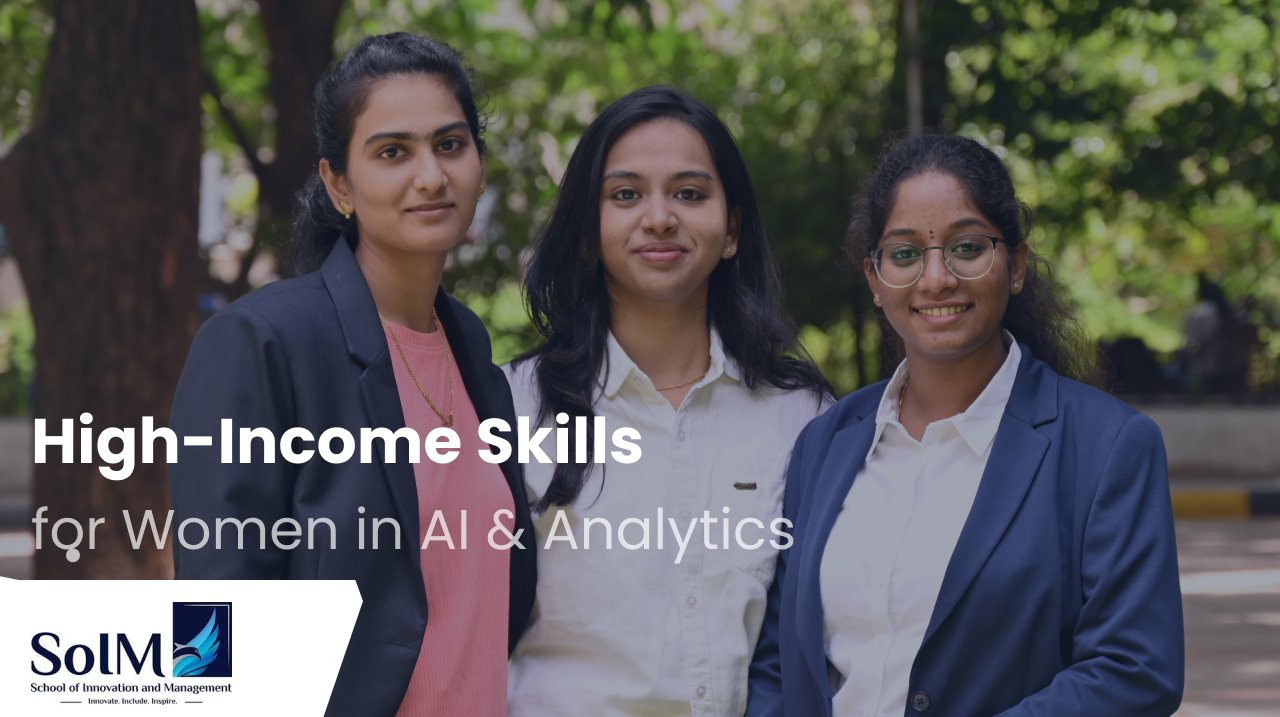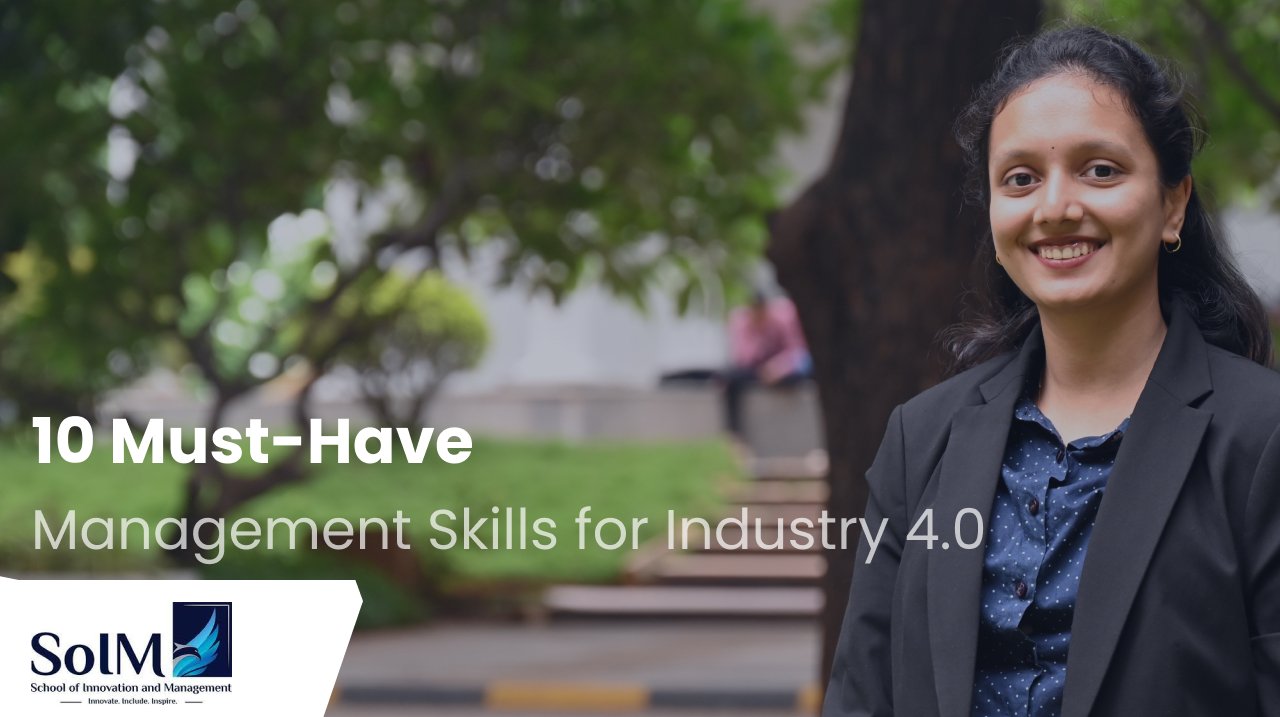
Financial technology has changed tremendously fast. Artificial Intelligence is being incorporated and used alongside big data in all aspects of Business; as such, students are expected to learn how to apply data along with AI in their PGDM. Financial institutions will always have a need for students who can model risk, identify fraud, execute trades, and provide market forecasts. A student adept with the changes will know how to differentiate themselves in a competitive job market.
Role of Big Data and AI in the Finance Field
Most processes in finance are now automated and use big data along with Artificial Intelligence. The job of risk modelling, for example, is now a lot easier because of AI that can uncover patterns and processes in the set data. The health will assess credit risk, loan default risk, and fraud risk by processing behavior data.
Trading has also seen the advent of AI-based algorithms. Sixty percent of those and other algorithmic trading deals are executed in microseconds. They make trades and manage market positions within risk and return paradigms, one so-called microsecond at a time. The bottom line must be considered as well as risk and return, and the financial firm will capture its exposure.
Data Analytics Tools Covered in PGDM Programs
In order to meet these urgent challenges, sophisticated PGDM programs have begun teaching powerful data analytics tools. At SoIM, the students in Financial Services or Business Analytics will use Python, R, SQL, and Power BI. The basic tools of data analysis, statistical modeling, and forecasting are these, then each growing in the exponent of a financial Prophet.
In the financial field, Python and R are used for building predictive models, simulations, and automation of processes. They learn how to work on data sets, interpreting and cleaning data, trend visualization, and growth action generation. Power BI gives them the ability to design dashboards that illustrate the financial information in a user-friendly, compelling medium. Such students will graduate with the confidence to employ these business analytics techniques to the real-world challenges they are most likely to face.
SoIM has data-driven learning resources, the foremost of which is the [PGDM in Business Analytics](https://soim.edu.in/pgdm-in-business-analytics-at-soim-hyderabad/) program.
Case Competitions and Live Projects Integrating Finance and Analytics
Gaining real exposure is vital to, and helps in the understanding of, the application of theory. Live projects and case competitions at SoIM focus on these skills by allowing the students to immerse themselves in real-world industry situations and challenges. These challenges require students to utilize their financial and analytical skills to solve intricate business problems in record time.
For example, students may be required to assess the financial standing of a company, construct a credit-scoring model, or perform a back-tested assessment of a defined set of investment strategies. Such exercises are designed to polish students’ technical aptitude while simultaneously nurturing their critical thinking, teamwork, and communication. These types of activities are what most employers are looking for; they encapsulate the ability to contribute on the very first day of work.
Experiential learning or learning by doing is the focus of the SoIM curriculum. It acts as a bridge between what is taught in the classroom and what is needed in the corporate world. It adds to the portfolio being built for placements.
Placement Opportunities: Careers in Quantitative and Data Roles
The demand for graduates in the field of finance and analytics is on the rise. Positions as a Quantitative Analyst, a Financial Data Scientist, or a Risk Analyst are some of the positions in demand at banks, investment companies, fintech startups, and consultancy firms.
“Quants” analyze financial markets while developing appropriate trading strategies through complex mathematical models. Data Scientists focus on distinguishing valuable information from the diverse sets of structured and unstructured data, utilizing modern machine learning and statistical techniques. They are instrumental in various aspects of product development, customer profiling, fraud detection, and portfolio management.
SoIM’s PGDM in Financial Services combines intensive coursework and industry-oriented training to fill the role of Data Scientists and Quants. Students also benefit from extensive strong corporate relations, which provide add-ons to the internships and placements. For an in-depth insight into the measures SoIM takes to enhance students in anchoring their careers, navigate to the placements page.
PGDM in Data Analytics in India: A Growing Preference
Demand for data literacy with management roles has caused a surge in the popularity of the PGDM in Data Analytics within India. Institutions are beginning to understand the importance of integrating business knowledge and data skills in order to prepare leaders of the future. A PGDM program designed with excellence teaches not only sophisticated technical skills, but also the importance of strategic thinking and communication.
This is in synergy with the wishes of the recruiters. A report by JK Business School outlines that recruiters are more inclined to hire candidates who possess strong skills in analytical thinking, the use of technology, and decision-making. These are the skills developed in the SoIM’s PGDM programs, which are specially designed for the analytics and finance areas.
AI in Finance Courses: Shaping Tomorrow’s Leaders
The latest technological advancements have positively steered the Finance world, and new AI in Finance courses have become a core component of a post-graduate management program. This includes investigation of the various AI Techniques such as Natural Language Processing (NLP), Robotic Process Automation (RPA), and Machine Learning (ML) within Finance.
Students learn how to analyze news to generate investment ideas, automate compliance with regulations, and construct trading platforms through intelligent agents. These scenarios illustrate the technological advancements changing the industrial landscape and how traditional roles in finance are paving the way to data-driven, high-impact careers.
Skills for PGDM Graduates
Like any other discipline, technical expertise is a requirement for any PGDM graduate. In their case, the needed competencies are:
* Communication, Analysis, and Logic
* Financial Basics and Projections
* Data Representation and Communication
* Proactive Collaboration
* Willingness to learn new skills
The SoIM’s vocational programs are a means of fostering this skill set as early as possible. This is achieved through the use of confidence-building through workshops blended with case simulation, mentorship, and company attachments.
Conclusion
Through impactful and transformative experiences of finance and technology, management executives will learn how to apply sophisticated tools of finance to drive organizational value and embrace academic and professional learning through rigorous and rich academic training and sustained professional efforts fostering deep inquiry at places like SoIM, which offers horizon-spanning PGDM positions in the Financial Services or Business Analytics domains.
The future positions of students aspiring to work as innovative Fintechs, quantitative analysts, or even financial strategists will require them to build a solid foundation incorporating the real impact of data and AI on the economic and technological ecosystem.
Pivot to the innovative and insightful future of work with ease by reading more on SoIM and the innovative PGDM programs aimed to empower students to streamline their careers alongside the evolving ecosystem to ensure sustained, impactful, and transformative growth.




